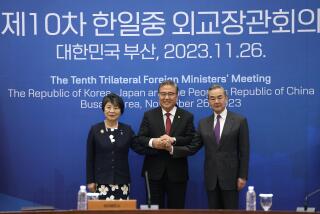ASIA : Tokyo, Seoul Set Sights on the Future
- Share via
TOKYO — With the World Cup soccer games bringing them together, the upcoming meeting between South Korean President Kim Young Sam and Japanese Prime Minister Ryutaro Hashimoto represents yet another effort to move a fragile relationship beyond an acrimonious past to a cooperative future.
Both sides say they are striving for an upbeat summit, scheduled for Saturday and Sunday on the South Korean island of Cheju.
Rather than dwelling on intractable problems of the past, the two sides say they will pledge a renewed partnership on issues ranging from North Korea’s food shortages to co-hosting the 2002 World Cup games.
But beneath the surface, mutual mistrust and simmering problems remain.
“Since Kim Young Sam’s government was launched, there have been some adverse developments in Korea-Japan relations. But the Korean government was not able to address these problems sincerely because of its domestic political agenda, such as the general elections,” said Kim Dal Choong, a Yonsei University professor. “The Cheju summit is primarily meant to smooth out some of these difficulties.”
North Korea is expected to top the agenda.
South Korean analysts say Kim hopes to enlist Tokyo’s aid in pressing his views on North Korea at the summit of industrialized nations next week in Lyon, France.
Seoul wants to be fully involved in any decisions to extend emergency food aid to poverty-stricken North Korea and to press for four-nation talks among the two Koreas, China and the United States.
But Japanese officials view such requests with mixed feelings.
One official said Hashimoto was initially cool toward Kim’s invitation to Cheju because he did not want to look like South Korea’s messenger boy.
“He didn’t want to compromise his pride and prestige as prime minister of Japan,” the official said.
Many Japanese view Kim as a political grandstander who too often exploits bilateral tensions to boost his domestic standings.
To many Koreans, however, he is a patriot who forcefully defends their national interests against the Japanese.
When Kim first took office in 1993, he announced that he would reemphasize relations with Japan and the United States--as opposed to his predecessor, Roh Tae Woo, who focused on forging relations with China and Russia. His declaration raised hopes for a fresh start between the two nations, but a series of incidents has quashed them.
In August, then-Prime Minister Tomiichi Murayama favorably impressed Koreans by apologizing for his nation’s colonial past--then set off an uproar a few months later by declaring that Japan’s 1910 annexation of Korea was legal. Cabinet minister Takami Eto also has been forced to resign after declaring Japan’s brutal colonization “did some good things.”
This year, relations worsened when Tokyo said that it would establish a 200-mile exclusive economic zone around its coast, reasserting its claim to two rocky isles that Korea also regards as its territory.
For its part, Tokyo is protesting what it sees as illegal Korean fishing in its waters.
Japan has also failed to settle the problem of how to make amends to mostly Korean and Chinese women forced into sexual slavery by Japan’s wartime military machine. A private “consolation” fund has fallen far short of its goals, and Tokyo is rejecting a United Nations recommendation to apologize and pay official compensation.
Virtually all Koreans--and some Japanese--believe that Tokyo is primarily to blame for the decline in relations.
“Japanese officials have only issued half-baked, weak expressions of regret,” said Haruki Wada, a Tokyo University history professor. “But concrete endeavors . . . and a performance that will move people’s hearts are necessary.”
Some Japanese officials, however, say Kim’s responses have been excessive. In their first meeting in Bangkok in March, for instance, Hashimoto tried to downplay differences with Seoul over the island issue, but Kim bluntly declared: “It is crystal clear [those islands are] our territory. We cannot accept Japan’s claim.” Kim also canceled a meeting with top Japanese politicians.
That response “embarrassed us and displeased us, but we understood it was something he had to say because of the [April] elections and [his] need to look tough on Japan,” a Japanese official said.
Now that Korea’s elections are over and Kim has cobbled together a working majority, officials here hope that he can move toward his original vision of strengthened ties.
So do many Koreans--such as Choi In Ho, who wrote a paean to stronger partnership in a recent newspaper column: “Korea, be thankful for Japan, for it is your target to catch up with; Japan be thankful for Korea, for it is your conscience to regain.”
Chi Jung Nam of The Times’ Seoul Bureau contributed to this report.
More to Read
Sign up for Essential California
The most important California stories and recommendations in your inbox every morning.
You may occasionally receive promotional content from the Los Angeles Times.














